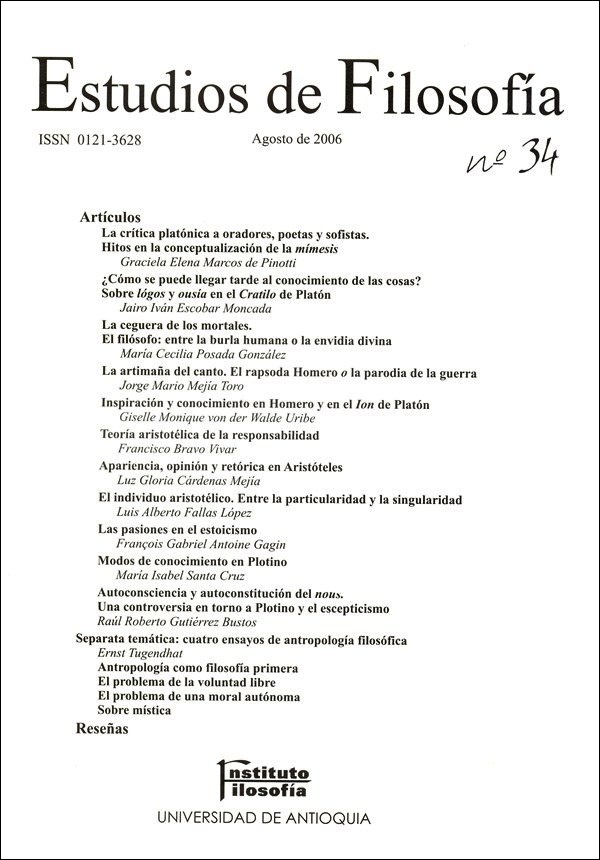Ways of knowledge in Plotinus
DOI:
https://doi.org/10.17533/udea.ef.12807Keywords:
Plotinus, intelligence, soul, self-knowledgeAbstract
After a brief introduction destined to bring mind the great lineaments of the Plotinian System, this paper analices three ways of knowledge or of apprehension that characterize the three levels of reality or hipostasis. On the level of intelligence, nous, which is determined as nouetical level, is verified a type of genuine knowledge, which is auto-knowledge. At the level of the soul, psyché, the dianoetical level, there is a type of knowledge of a discursive type that only in a secondary sense and in a denvated one is knowledge of itself. Lastly, on the level of the One, tó hèn, the supranoeticol level, can we speak of a knowledge of the self only in the traslaticious sense and "eminential”, since the first principle of reality, which is absolute unity, having no duplicity whatsoever, in a strict sense cannot have thought, not even of the self but, at the same time, is not inherent, but is absolute fullness. This paper tries to show how Plolinus finds support in the type ofknowledge of the intelligence, which serves him as a central point, to articulate the three types of knowledge and to characterize an "infra-self-knowledge ", that of the soul, and a “supra- setf-knowledge”, that of the One.
Downloads
References
Beierwaltes, W. ‘Selbsterkenntnis' Selbsterkenntnis und Erfahrung der Einheit. Plotin Enneade V, 3. Text, Übersetzung, Interpretation, Erläuterungen, Frakfúrt/Main, Klostermann, 1991 (hay trad, italiana).
Cilento, V. Paideia antignostica. Ricostruzione d'un único serillo da Enneadi III8, V8, V5, II9, Biblioteca nazionale, Serie di classici greci e latini. Testi con commento filológico, 9, Firenze, Le Monnier, 1971.
___________ . “Contemplazione”, en: Saggi su Plotino, Milano, U. Murcia & Co., 1973, pp. 5-27.
D’Ancona Acosta, C. “Plan du traité”, en: Dixsaut (éd.), pp. 173-177. DOI: https://doi.org/10.4000/books.vrin.4010
Dixsaut, M. (éd.) La connaissance de soi. Eludes sur le traité 49 de Plotin, Paris, Vrin, 2002. DOI: https://doi.org/10.4000/books.vrin.3875
Eborowicz, W. “La contemplation selon Plotin”, en: Giornale di metafísica 12, 4 (1957) 472-518 y 13,1 (1958)42-82.
Gerson, L. Plotinus, London and New York, Routledge, 1994.
Hadot, P. “Étre, Vie, Pensée chez Plotin et avant Plotin”, en : Sources de Plotin, Entretiens sur l'Antiquité Classique, 5, Vandoeuvres-Genéve, 21-29 aoút 1957, Fondation Hardt, 1960, pp. 107-157.
Ham, B. Traité 49 (V, 3). Les Écrits de Plotin publiés dans l'ordre chronologique, intr. trad., comm, et notes, sous la dir. de P. Hadot, Paris, Éd. du Cerf, 2000.
Hunt, D. “Contemplation and hypostatic procesión in Plotinus”, Apeiron 15,2 (1981) 71-79. DOI: https://doi.org/10.1515/APEIRON.1981.15.2.71
Kühn, W. “Comment il ne faut pas expliquer la connaissance de soi-méme”, en: Dixsaut. M. (éd.), pp. 229-266. DOI: https://doi.org/10.4000/books.vrin.4035
Lavaud, L. “Structure et themes du traité 49”, en: Dixsaut (éd.), pp. 179-207. DOI: https://doi.org/10.4000/books.vrin.4020
Oosthout, H. Modes of Knowledge and the Transcendental. An Introduction to Plotinus Ennead 5.3 [49], Amsterdam-Philadelphia, B. R. Grüner, 1991. DOI: https://doi.org/10.1075/bsp.17
Santa Cruz, M. I., “Plotin face á Platon. Un exemple d'exégése plotinienne (En néade VI 8 [39], 18)”, en Fattal, M. (ed.). Etudes sur Plotin, Paris, L'Harmattan, 2000, pp. 193-216.
Santa Cruz, M. I. “L'Un est-il intelligible?”, en: Dixsaut, M. (éd.), pp. 73-90. DOI: https://doi.org/10.4000/books.vrin.3950
Schwyzer, H. R. “Bewusst und Unbewusst bei Plotin”, en: Sources de Plotin, op. cit., pp.341-390.
Violette. “Les formes de la conscience chez Plotin”, Revue des Eludes Grecques 107(1994)222-237. DOI: https://doi.org/10.3406/reg.1994.2618
Warren, E. “Consciousness in Plotinus”, Phronesis 9 (1964) 83-97. DOI: https://doi.org/10.1163/156852864X00122
Downloads
Published
How to Cite
Issue
Section
Categories
License
Copyright (c) 2006 María Isabel Santa Cruz

This work is licensed under a Creative Commons Attribution-NonCommercial-ShareAlike 4.0 International License.
Authors who publish with this journal agree to the following terms:
1. The Author retains copyright in the Work, where the term "Work" shall include all digital objects that may result in subsequent electronic publication or distribution.
2. Upon acceptance of the Work, the author shall grant to the Publisher the right of first publication of the Work.
3. The Author shall grant to the Publisher a nonexclusive perpetual right and license to publish, archive, and make accessible the Work in whole or in part in all forms of media now or hereafter known under a Creative Commons Attribution-NoCommercia-ShareAlike (CC BY-NC-SA 4.0), or its equivalent, which, for the avoidance of doubt, allows others to copy, distribute, and transmit the Work under the following conditions: (a) Attribution: Other users must attribute the Work in the manner specified by the author as indicated on the journal Web site;(b) Noncommercial: Other users (including Publisher) may not use this Work for commercial purposes;
4. The Author is able to enter into separate, additional contractual arrangements for the nonexclusive distribution of the journal's published version of the Work (e.g., post it to an institutional repository or publish it in a book), as long as there is provided in the document an acknowledgement of its initial publication in this journal;
5. Authors are permitted, and Estudios de Filosofía promotes, to post online the preprint manuscript of the Work in institutional repositories or on their Websites prior to and during the submission process, as it can lead to productive exchanges, as well as earlier and greater citation of published work (see The Effect of Open Access). Any such posting made before acceptance and publication of the Work is expected be updated upon publication to include a reference to the Estudios de Filosofía's assigned URL to the Article and its final published version in Estudios de Filosofía.















